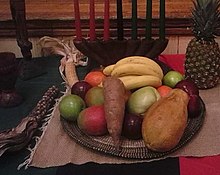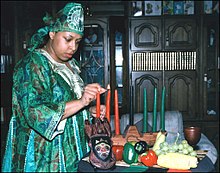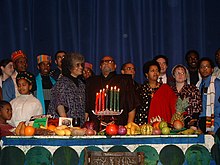콴자
Kwanzaa| 콴자 | |
|---|---|
 키나라에 있는 일곱 개의 촛불은 관자의 일곱 가지 원칙을 상징합니다. | |
| 관찰자 | 아프리카 디아스포라의 일부인 아프리카계 미국인들 |
| 유형 | 문화민족 |
| 의의 | 아프리카의 유산, 통일, 문화를 기념합니다. |
| 세레모니즈 |
|
| 날짜. | 12월26일~1월1일 |
| 관련 | 범아프리카주의 |
| 시리즈의 일부(on) |
| 아프리카계 미국인 |
|---|
Kwanzaa(/ˈkw ən.z ɑː/)는 12월 26일부터 1월 1일까지 매년 열리는 아프리카계 미국인 문화의 기념 행사로, 보통 6일째 되는 날에 Karamu라는 공동 연회로 끝이 납니다.서부와 동남 아프리카의 여러 지역의 아프리카 추수 축제 전통을 바탕으로 활동가 Maulana Karenga에 의해 만들어졌습니다.콴자는 1966년에 처음으로 기념되었습니다.2015년 조사에 따르면 조사 대상자의 1.9%가 콴자를 축하할 계획을 가지고 있는 것으로 나타났습니다. 미국 내 약 600만 명이 살고 있습니다.[2]
역사와 어원
미국인 Maulana Karenga는 Watts 폭동의[3] 여파가 있었던 1966년에 구체적으로 아프리카계 미국인의 휴일로서 Kwanzaa를 만들었습니다.[4]카렌가는 "흑인들에게 기존 크리스마스 휴일의 대안을 제공하고 흑인들에게 지배적인 사회의 관행을 단순히 모방하는 것이 아니라 자신과 역사를 기념할 기회를 주는 것"이 목표라고 말했습니다.[5]1960년대와 1970년대 흑인권력운동의 주요 인물이었던 카렌가에게 이러한 휴일의 창설은 또한 "폭력혁명 이전에 문화혁명이 있어야 한다"는 필수적인 전제를 강조했습니다.문화혁명은 정체성, 목적, 방향성을 부여합니다."[6]
카렝가에 따르면, 콴자라는 이름은 "첫 번째 과일"을 의미하는 스와힐리어 matunda ya kwanza에서 유래했습니다.[7]남아프리카에는 12월과 1월에 동지와 함께 기념되는 첫 번째 과일 축제가 있으며, 카렌가는 줄루 축제 Umkhosi Wokweshwama에 대해 읽은 설명에서 부분적으로 영감을 받았습니다.[8]기념일의 이름에 "a"를 추가하여 상징적인 일곱 글자를 갖도록 하기로 결정되었습니다.[9]
Karenga는 Kwanzaa의 초기 몇 년 동안 크리스마스에 대한 대안이 될 것이라고 말했습니다.그는 예수가 정신병적이고 기독교는 흑인들이 피해야 할 "백인" 종교라고 믿었습니다.[10]Kwanzaa가 주류 지지자들을 얻으면서, Karenga는 실천하는 기독교인들이 소외되지 않도록 그의 입장을 바꾸었고, 1997년 책 Kwanza: A Celebration of Family, Community, and Culture에서 "Kwanza는 사람들에게 그들의 종교 또는 종교 휴일에 대한 대안을 제공하기 위해 만들어진 것이 아닙니다"라고 진술했습니다.[11]콴자를 기념하는 많은 아프리카계 미국인들은 크리스마스를 기념하는 것 외에도 그렇게 합니다.[12]
캘리포니아에서 처음 만들어진 이후, 콴자는 미국 밖으로 퍼져나갔습니다.[13]2022년 12월, 알 샤프턴 목사, 에릭 애덤스 시장, 사업가 로버트 F. 스미스, 콘래드 틸라드 목사, 랍비 슈뮬리 보티치, 엘리샤 비젤이 카네기 홀에서 함께 콴자와 하누카를 축하하기 위해 합류했습니다.[14][15][16][17]
응우조 사바 (7대 원칙)

콴자는 그것의 창시자가 콴자의 7대 원칙, 즉 응우조 사바 (원래 응우조 사바 – 아프리카 유산의 7대 원칙)라고 불렀던 것을 기념합니다.그것들은 콴자보다 1년 앞선 1965년에 개발되었습니다.이 7가지 원칙은 모두 스와힐리어이며, 민족주의, 범아프리카주의, 사회주의 가치의 종합인 카와이다 또는 "공통" 철학으로 구성되어 있습니다.
콴자의 7일은 각각 다음과 같은 원칙들 중 하나에 바쳐집니다.[18]
- 우모자(유니티):가족, 공동체, 국가, 인종의 통합을 위해 노력하고 유지하는 것.
- 쿠지차굴리아 (자기결정권):우리 자신을 정의하고 이름을 짓는 것은 물론, 스스로 창조하고 말하는 것입니다.
- 우지마(일괄 및 책임):우리의 공동체를 함께 건설하고 유지하며 형제자매의 문제를 우리의 문제로 만들고 함께 해결하는 것입니다.
- 우자마 (협동경제학):우리만의 가게, 상점, 기타 사업을 건설하고 유지하며 함께 이익을 얻는 것입니다.
- 니아(목적):우리의 공동체적 소명을 공동체의 건설과 발전으로 만들어 우리 민족을 전통적 위대함으로 회복시키는 것입니다.
- 쿰바(창의력):우리가 할 수 있는 한 언제나 할 수 있는 한, 우리가 물려받은 것보다 더 아름답고 유익한 공동체를 떠나기 위해 우리가 할 수 있는 한 많이 하는 것입니다.
- 이마니(신앙):우리 민족, 부모님, 선생님, 지도자들, 그리고 투쟁의 의와 승리를 온 마음을 다해 믿는 것입니다.
기호

콴자 축하 상징물에는 다른 상징물이 놓여있는 매트(Mkeka)가 포함됩니다.
- 키나라(7개의[19] 촛대용 촛대)
- 미슈마아 사바(초7개)
- 마자오(crops)
- 축하하는 아이들을 대표하는 마힌디(옥수수). 그리고 옥수수는 명절 식사의 일부일 수도 있습니다.[20]
- 아프리카 조상들에게 슈크라니를 기념하고 선물하기 위한 키콤베차 우모자(유니티컵)
- 자와디(선물).
보충적인 표현으로는 응우조 사바 포스터,[21] 검은색, 빨간색, 초록색 벤데라(깃발), 아프리카 책과 예술작품 등이 있는데, 이들은 모두 아프리카 문화를 반영하고 공동체 건설과 강화에 기여하는 가치와 개념을 나타냅니다.[22]
옵서버런스

콴자를 축하하는 가족들은 그들의 가정을 예술품, 켄테와 같은 다채로운 아프리카 옷, 특히 여성들이 카프탄을 입는 것, 그리고 아프리카 관념론을 나타내는 신선한 과일로 장식합니다.관자의식에 아이들을 포함시키고 조상들에게 존경과 감사를 드리는 것이 관례입니다.해방은 일반적으로 모든 기념인들에게 전해지는 일반적인 성배인 Kikombe cha Umoja와 공유됩니다.아프리카계가 아닌 미국인들도 콴자를 기념합니다.[23]"즐거운 콴자"는 명절에 인사말로 사용될 수 있습니다.[24][25][26]
콴자 의식은 드럼과 음악 선택, 해방, 아프리카 공약과 흑인의 원칙에 대한 낭독, 범아프리카 색에 대한 성찰, 당시의 아프리카 원칙에 대한 토론 또는 아프리카 역사의 한 장, 촛불을 밝히는 의식, 예술적 공연, 그리고 마지막으로,신앙의 향연 (Karamu Ya Imani)[27][28]콴자의 각 날의 인사말은 하바리 가니요,[29] 스와힐리는 "안녕하십니까?"를 뜻합니다.[30]
처음에, 콴자의 관찰자들은 휴일 또는 그것의 상징, 가치, 그리고 실천이 다른 휴일들과 섞이는 것을 피했는데, 그렇게 하는 것은 쿠지차굴리아 (자기 결정권)의 원칙을 위반하고 따라서 부분적으로 중요한 아프리카 가치의 재생으로 의도된 휴일의 통합성을 위반하기 때문입니다.오늘날, 어떤 아프리카계 미국인 가족들은 크리스마스와 새해와 함께 콴자를 기념합니다.[31]
문화 전시회에는 매년 존 F에서 열리는 기념행사인 콴자의 정신이 포함됩니다. 해석적 춤, 아프리카 춤, 노래 그리고 시를 특징으로 하는 케네디 공연 예술 센터.[32][33][34]
카라무
Karamu Ya Imani (믿음의 축제)는 일반적으로 콴자 시대의 6번째 날인 12월 31일에 열리는 축제입니다.카라무 축제는 1971년 범아프리카 단체들의 도시 전역의 운동 중에 시카고에서 개발되었습니다.슐레야 와토의 한니발 아프리크가 지역사회 전반의 홍보 및 교육 캠페인으로 제안했습니다.최초의 카라무 야이마니는 1973년 1월 1일 리지랜드 클럽에서 200명의 사람들이 모인 자리에서 발생했습니다.[35]
1992년, 전국 흑인 연합 시카고 전선은 미국에서 가장 큰 카라무 야 이마니 기념식을 열었습니다.춤, 청소년 앙상블, NBUF와 유명한 흑인 민족주의 지도자 콘래드 워릴의 기조 연설이 포함되었습니다.[36]
축하 행사에는 다음과 같은 관행이 포함됩니다.
- 쿠카리비샤(웰컴)
- 쿰바 (리멤버)
- 쿠춘구자 테나 나 쿠토아 아하디 테나 (재평가 및 추천)
- 쿠샨길리아 (즐거움)
- 탐실라 탐비코 (해방선언문)
- Tamshila Tutaonana (이별 성명서)
고수
콴자 기념행사의 인기는 흑인 분리주의 운동의 인기가 시들해지면서 떨어졌습니다.[37][38][39][40]Kwanzaa 관찰은 지역사회와 상업적 맥락에서 모두 감소했습니다.[41][42][43]미네소타 대학의 키스 메이스 교수는 마틴 루터 킹 주니어라고 이름 붙인 다른 세 개의 주요 아프리카계 미국인 휴일에 대해서도 이것들을 결정하는 것이 어렵다고 언급하면서 정확한 수치를 보고하지 않았습니다. 데이, 말콤 X 데이, 그리고 6월 19일.[44]메이즈는 백인 기관들도 이제 이를 기념한다고 덧붙였습니다.[23]

전미 소매업 연맹은 2004년부터 겨울 휴가에 대한 마케팅 설문조사를 후원해 왔으며, 2015년에는 조사 대상자의 1.9%가 콴자를 축하할 계획으로 미국에서 약 600만 명의 사람들이 참여자 중 1.9%가 콴자를 축하할 계획인 것으로 나타났습니다.[2]
1990년대를 시작으로 이 휴일은 점점 상업화되어 1992년에 최초의 홀마크 카드가 판매되었습니다.[45]일부는 이로 인해 명절의 가치가 훼손될 수 있다는 우려를 나타냈습니다.[46]
인지도
Synthia Saint James에 의해 디자인된 최초의 콴자 우표는 1997년에 미국 우체국에 의해 발행되었고, 같은 해에 빌 클린턴은 그 휴일을 기념하는 최초의 대통령 선언을 했습니다.[47][48]후임 대통령인 조지 W. 부시,[49] 버락 오바마,[50] 도널드 트럼프,[51] 조 바이든도[52] 콴자를 축하하기 위해 인사를 건넸습니다.
Maya Angelou는 M. K. Asante가 각본과 감독을 맡고 척 D가 출연한 Kwanzaa, The Black Candle에 관한 2008년 다큐멘터리 영화의 내레이션을 맡았습니다.[53][54]
미국 밖에서의 실습
콴자를 기념하는 다른 나라들로는 영국, 자메이카, 프랑스, 캐나다, 브라질 등이 있습니다.[55]
캐나다에서는 서스캐처원과[56] 온타리오를 포함한 지방에서 기념됩니다.콴자 주 1주일은 2018년 토론토에서 처음 선언되었습니다.[57]브리티시 콜롬비아와 같은 지방에는 2010년대에 등장한 지방 지부들이 있는데, 이 지부들은 훨씬 더 작은 디아스포라 그룹들이 있고, 설립 멤버들은 우간다와 같은 나라들에서 온 이민자들일 수도 있습니다.[58]
참고 항목
참고문헌
- ^ "Why Kwanzaa Video". Maulana Karenga. Archived from the original on December 11, 2021. Retrieved December 7, 2020.
- ^ a b "Prosper Insights & Analytics, Monthly Consumer Survey" (PDF). National Retail Federation. October 2015.[데드링크]
- ^ 와일드, 안나 데이."주류 콴자"공익 119 (1995): 68–80
- ^ Alexander, Ron (December 30, 1983). "The Evening Hours". The New York Times. Retrieved December 15, 2006.
- ^ 문화, 원칙을 기념하는 Kwanzaa 2011년 7월 8일 Wayback Machine에서 보관
- ^ Mayes, Keith A. (2009). Kwanzaa: Black Power and the Making of the African-American Holiday Tradition. pp. 63–65. ISBN 978-0415998550. Retrieved December 27, 2015.
- ^ Holly Hartman. "Kwanzaa – Honoring the values of ancient African cultures". Infoplease.com. Retrieved October 25, 2017.
- ^ Mayes, Keith A. (2009). Kwanzaa: Black Power and the Making of the African-American Holiday Tradition. Routledge. p. 84. ISBN 9781135284008.
- ^ Mayes, Keith A. (2009). Kwanzaa: Black Power and the Making of the African-American Holiday Tradition. Routledge. p. 228. ISBN 9781135284015.
- ^ 카렌가, 마울라나(1967).'종교'.클라이드 할리시, 제임스 음툼.인용 가능한 카렌가.로스앤젤레스:산코레 대학 출판부 25쪽 23769.8쪽
- ^ Karenga, Maulana (1997). Kwanzaa: A Celebration of Family, Community and Culture. University of Sankore Press. p. 121. ISBN 978-0943412214.
- ^ Williams, Lena (December 20, 1990). "In Blacks' Homes, the Christmas and Kwanzaa Spirits Meet". The New York Times. Retrieved May 7, 2010.
- ^ "Kwanzaa – African-American Holiday". Encyclopædia Britannica. Encyclopædia Britannica, inc. Retrieved January 6, 2020.
Although Kwanzaa is primarily an African American holiday, it has also come to be celebrated outside the United States, particularly in the Caribbean and other countries where there are large numbers of descendants of Africans.
- ^ "Mayor Eric Adams, Rev. Al Sharpton, others gather for joint Kwanzaa, Hanukkah celebration". New York Amsterdam News. December 21, 2022.
- ^ Stewart Ain and TaRessa Stovall (December 23, 2022). "Kwanzakkah: A way to celebrate dual heritage, and combat hate". The Forward.
- ^ "Mayor Eric Adams, Rev. Al Sharpton, Robert F. Smith, Robert F. Smith, Rev. Conrad Tillard, Rabbi Shmuley Boteach and Elisha Wiesel join together to host '15 Days of Light,' celebrating Hanukkah and Kwanzaa". JNS.
- ^ "Black and Jewish Leaders Gather at Carnegie Hall to Take a Stand Against Antisemitism and Racism". Yahoo. December 20, 2022. Archived from the original on December 25, 2022. Retrieved December 27, 2022.
- ^ Karenga, Maulana (2008). "Nguzo Saba". The Official Kwanzaa Web Site. Archived from the original on December 31, 2019. Retrieved December 30, 2017.
- ^ "Definition of KINARA". www.merriam-webster.com. Retrieved December 20, 2019.
- ^ Raabe, Emily (2001). A Kwanzaa Holiday Cookbook. Rosen Publishing. p. 12. ISBN 978-0823956296.
- ^ Angaza, Maitefa (2007). Kwanzaa – From Holiday to Every Day: A complete guide for making Kwanzaa a part of your life. New York: Dafina Books. p. 56. ISBN 978-0758216656.
- ^ "The Symbols of Kwanzaa". The Official Kwanzaa Website. Archived from the original on December 4, 2016. Retrieved January 9, 2016.
- ^ a b Scott, Megan K. (December 17, 2009). "Kwanzaa celebrations continue, but boom is over, popularity fading". The Plain Dealer. Associated Press. Retrieved December 24, 2017.
- ^ Bush, George W. (December 23, 2004). "Presidential Kwanzaa Message, 2004". Office of the Press Secretary. Retrieved December 24, 2007.
- ^ "Clinton offers holiday messages". CNN. December 23, 1997. Retrieved December 24, 2007.
- ^ Gale, Elaine (December 26, 1998). "Appeal of Kwanzaa continues to grow; holidays: today marks start of the seven-day celebration of African culture, which began in Watts 32 years ago and is now observed by millions". Los Angeles Times. Archived from the original on June 5, 2013. Retrieved December 24, 2007.
- ^ Johnson, James W.; Johnson, F. Francis; Slaughter, Ronald L. (1995). The Nguzo Saba and the Festival of Fruits. Gumbs & Thomas Publishers. p. 42. ISBN 9780936073200.
- ^ "A Great Kwanzaa Feast - Kwanzaa Epicurious.com". Epicurious.
- ^ "The Founder's Message 2000". The Official Kwanzaa Web Site. Archived from the original on December 4, 2016. Retrieved December 27, 2016.
- ^ "Useful Swahili phrases". Omniglot.com. Retrieved December 27, 2016.
- ^ "Kwanzaa (until Jan 1) in the United States". Timeanddate.com. Retrieved December 27, 2016.
- ^ "The Spirit of Kwanzaa – The John F. Kennedy Center for the Performing Arts". Kennedy-center.org. Retrieved December 27, 2016.
- ^ "Dance Institute of Washington". February 21, 2001. Archived from the original on February 21, 2001. Retrieved October 25, 2017.
- ^ "Kwanzaa Featured on This Year's Holiday U.S. Postage Stamp". October 19, 2004. Archived from the original on October 19, 2004. Retrieved October 25, 2017.
- ^ Mayes, Keith (2006). Peniel Joseph (ed.). The Black Power Movement: Rethinking the Civil Rights-Black Power Era. Taylor & Francis Group. pp. 244–245. ISBN 978-0-415-94596-7.
- ^ McFarland, Melanie (December 25, 1992). "Kwanzaa Is A Time Of Reflection - Chicago Tribune". Chicago Tribune. Retrieved December 24, 2011.
- ^ Stanley, Sharon (2017). An impossible dream? : racial integration in the United States. New York: Oxford University Press. ISBN 978-0190639976.
- ^ Hall, Raymond (1977). Black separatism and social reality : rhetoric and reason. New York: Pergamon Press. ISBN 9780080195100.
- ^ Dattel, Gene (2019). "Separatism vs. Integration: Can Separate Ever Be Equal?". Academic Questions. 32 (4): 476–486. doi:10.1007/s12129-019-09822-4. S2CID 214460772.
- ^ "Is Kwanzaa Still A Thing?". NPR.
- ^ Fantozzi, Madison. "Polk events celebrate values of African culture". The Ledger.
- ^ "Significance Of Kwanzaa Changes Over The Years". NPR.
- ^ Schumacher-Matos, Edward (January 7, 2013). "Gaining Or Losing Credibility By Humanizing A Reporter: A Kwanzaa Story". NPR.
- ^ Mayes, Keith (2009). Kwanzaa : black power and the making of the African-American holiday tradition. New York: Routledge. pp. 210, 274. ISBN 9780415998550.
- ^ Martin, Douglas (December 20, 1993). "The Marketing of Kwanzaa; Black American Holiday Earns Dollars, Causing Concern". The New York Times. ISSN 0362-4331. Retrieved December 24, 2017.
- ^ "Commercialized Kwanzaa worries enthusiasts". The Billings Gazette. Retrieved December 24, 2017.
- ^ "William J. Clinton: Message on the Observance of Kwanzaa, 1997". www.presidency.ucsb.edu. Archived from the original on December 31, 2017. Retrieved December 31, 2017.
- ^ Pleck, Elizabeth (2001). "Kwanzaa: The Making of a Black Nationalist Tradition, 1966–1990" (PDF). Journal of American Ethnic History. 20 (4): 3–28. doi:10.2307/27502744. JSTOR 27502744. Archived from the original (PDF) on March 15, 2017.
- ^ "Presidential Kwanzaa Message, 2004" (Press release). The White House. Retrieved December 28, 2020.
- ^ "Statement by the President and the First Lady on Kwanzaa" (Press release). The White House. December 26, 2015. Retrieved December 28, 2020.
- ^ "Presidential Message on Kwanzaa" (Press release). The White House. December 26, 2019. Retrieved December 29, 2019.
- ^ Biden, Joe [@POTUS] (December 26, 2021). "As we begin the seven days of Kwanzaa, Jill and I send our best wishes to everyone celebrating" (Tweet). Retrieved December 24, 2022 – via Twitter.
- ^ "Kwanzaa Celebration Captured In 'Black Candle'". National Public Radio. December 15, 2008.
- ^ "Chuck D and Maya Angelou in Kwanzaa Documentary". Essence. December 18, 2009.
- ^ Lord, Mark (December 22, 2016). "Celebrating the life-affirming tenets of Kwanzaa". Queens Chronicle. Retrieved December 1, 2022.
- ^ "Sask. African Canadian Heritage Museum celebrates Kwanzaa in Regina - CBC News". CBC. December 28, 2019. Retrieved December 1, 2022.
- ^ "Proclamations declaring Kwanzaa week in Toronto and Brampton a first for Canada". WBFO. December 27, 2018. Retrieved December 1, 2022.
- ^ Service, Wire (December 14, 2021). "Kwanzaa, the 7 most important days of the year, approaching for many African-Canadians". Saanich News. Retrieved December 1, 2022.
추가열람
- Medearis, Angela Shelf (1994), The Seven Days of Kwanzaa, Scholastic Paperbacks, ISBN 0-590-46360-8
- Seton, Susannah (2000), Simple Pleasures for the Holidays, Conari, ISBN 1-57324-515-1
- Brady, April A. (2000), Kwanzaa Karamu, Lerner Publishing Group, ISBN 0-87614-842-9
- Karenga, Maulana (1998), Kwanzaa: A Celebration of Family, Community, and Culture, University of Sankore Press, ISBN 0-943412-21-8
- Marsh, Carole (2003), Kwanzaa: Activities, Crafts, Recipes, and More!, Gallopade International, ISBN 0-635-02173-0
- Anganza, Maitefa (2007), Kwanzaa: from Holiday to Every Day, Kensington Publishing Corporation, ISBN 978-0-7582-1665-6
- Gamble-Gumbs, Ida (1998), How to Plan a Kwanzaa Celebration, Cultural Expressions, Inc., ISBN 0-9629827-1-7
- Hintz, Martin (1996), Kwanzaa: Why We Celebrate It the Way We Do, Capstone Press, ISBN 1-56065-329-9
- Asante, Molefi K.; Mazama, Ama (2005), Encyclopedia of Black Studies, SAGE, ISBN 0-7619-2762-X
외부 링크
- 공식 홈페이지
- 검은 양초: 마야 안젤루가 내레이션을 맡은 콴자 영화
- 2007년 12월 30일 Wayback Machine에서 Karenga Archive가 Kwanza를 만든 이유
- 역사채널: 콴자아
- "The Meaning of Kwanzaa in 2003". The Tavis Smiley Show. NPR. December 26, 2003. 인터뷰: 카렌가는 명절의 진화와 그 의미에 대해 논의합니다.


